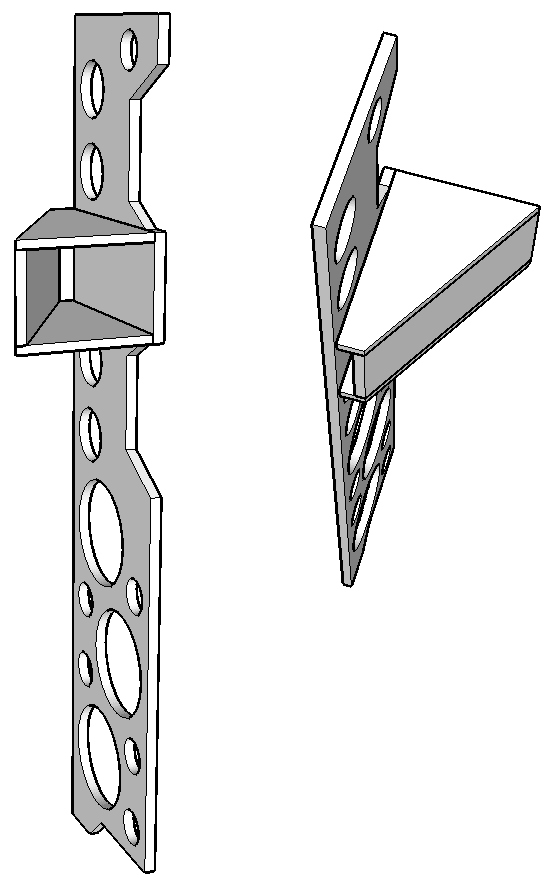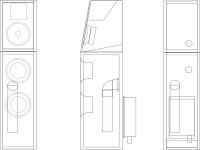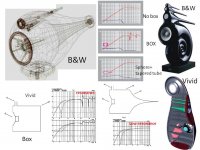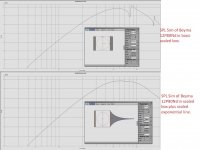hi! I was wondering if there are any documented DIY projects that use a TL mid in conjunction with a sealed or vented woofer? I am new to the TL concept and read in the Loudspeaker Cookbook that using a TL for a mid is something that is beneficial and is not often found in commercial designs. I know the Vandersteen speakers use this approach, and I was just curious if anyone else has done it and perhaps if there were any details on how one might design such a beast.
Thanks!
Thanks!
I've heard of it being done before, and even saw a project somewhere. It's a neat idea, because you can eliminate the impedance peak that prevents you from using a 1st order highpass filter on the mid.
Dan
Dan
I am planning a 3 way and was also thinking of TLing the midrange. Dickason (from memory) recommended a TL if the low/mid xo point was at least 2 octaves from midrange Fs (and sealed otherwise) - or I might have that the wrong way around.
In any case I presume the advantage of TL loading is reducing backwave pressure from a conventional sealed enclosure resulting in a more neutral midrange sound (aka open baffle) - but have the asthetic advantage of a "box" speaker (if you consider that an asthetic advantage).
David.
In any case I presume the advantage of TL loading is reducing backwave pressure from a conventional sealed enclosure resulting in a more neutral midrange sound (aka open baffle) - but have the asthetic advantage of a "box" speaker (if you consider that an asthetic advantage).
David.
http://www.htguide.com/forum/showthread.php4?t=25932
Maybe not a TL but a damped open back midrange. Supposed to be really good! 🙂
Maybe not a TL but a damped open back midrange. Supposed to be really good! 🙂
I guess it really depends on how low you want the mid to go, if its crossed at 300hz then there is not much difference to having a large sealed/stuffed box.
For my 3 ways I just used exaclty that, with a non-parallel top/bottom, so the mid chamber reduces in size towards the back of the enclosure (kind of like a TL).
If your mid was crossed first order at 100hz then it maybe beneficial.
Andrew.
For my 3 ways I just used exaclty that, with a non-parallel top/bottom, so the mid chamber reduces in size towards the back of the enclosure (kind of like a TL).
If your mid was crossed first order at 100hz then it maybe beneficial.
Andrew.
http://digilander.libero.it/piani/cataloghi_tdl/generale-2.jpg
TDL made speakers with T/L mid and woofer, so maybe you will get some idea.🙂
TDL made speakers with T/L mid and woofer, so maybe you will get some idea.🙂
Ap said:I guess it really depends on how low you want the mid to go, if its crossed at 300hz then there is not much difference to having a large sealed/stuffed box.
For my 3 ways I just used exaclty that, with a non-parallel top/bottom, so the mid chamber reduces in size towards the back of the enclosure (kind of like a TL).
If your mid was crossed first order at 100hz then it maybe beneficial.
Andrew.
Ap: cool! do you have any plans / pics I could take a peek at?
Also, I'm thinking first-order at around 150 Hz
So in the above case that Jonasz gave, a TL with taper of 1 is used. Are there some formulas or guidance on what different widths and lengths, or geometries will do in the case of a midrange? LDC has some good information for some of the more popular geometries... I wouldn't consider any folded options, maybe the straight, tapered, or the other one listed in LDC and then vary the stuffing of the line for tuning.
Also, are there any indications from the T/S parameters if a mid would work well in these TL shapes?
also, another question in addition to the above. What do people use to model transmission lines? The formulas given in LDC are really too general, they don't even have tables for a straight line with taper = 1.
This is a plan view which gives you a bit of an idea.
Essentially the mid box is non-paralleled stuffed with wool/poly.
Crossover is 300hz 2nd order so the drivers dont do any bass.
As for formulas I built a TL (or tapered quarter wave) sub using the 1/4 length of Fs (tuning) & taper of 1.25 x Sd to 1 x Sd,
there is some good modelling software around which can model response for you.
Andrew.
Essentially the mid box is non-paralleled stuffed with wool/poly.
Crossover is 300hz 2nd order so the drivers dont do any bass.
As for formulas I built a TL (or tapered quarter wave) sub using the 1/4 length of Fs (tuning) & taper of 1.25 x Sd to 1 x Sd,
there is some good modelling software around which can model response for you.
Andrew.
Attachments
Ap said:there is some good modelling software around which can model response for you.
links?
😀
looks very nice. I'm thinking more of a straight TL with taper = 1, but once I get something to model things, I may find something I like better. I will need a configuration that will load the mid to low frequencies though ...
Question, TL enclosures are ideal environment for any drivers right? The math used is for the low end limit only? So why only subs? why not Subs, mids, and tweets, or 2way 3way speakers used in TL. I had a Bose wave Cannon a long time ago that I miss dearly use to hang from my ceiling. Now Im thinking why not build all three degrees or two degrees of TL up on the ceiling. Sono and Smaller tubing?
The math doesn't change, though tweeters usually have a sealed back and from very limited experience [one pair] can say that cutting it off and adding a TL didn't alter its performance enough to justify the effort, but then it was just a cheap 2" paper cone unit, so might be if it's one of those shrill/'bright' titanium or cheap alum. [super] tweeters. Only one way to know for sure......
Agree that it's the best overall loading scheme for the ~250-2500 Hz critical speech [telephone] BW, so a ~62.5 - 10 kHz F24 'mids' BW in a three way is a good plan IME.
IME, the tube diameter needs to be significantly larger in area than driver's Sd as opposed to the ancient conventional wisdom to be equal to Sd or B0$3's 0.5 Sd, though with today's design software one can easily dial it in using its T/S specs.
GM
Agree that it's the best overall loading scheme for the ~250-2500 Hz critical speech [telephone] BW, so a ~62.5 - 10 kHz F24 'mids' BW in a three way is a good plan IME.
IME, the tube diameter needs to be significantly larger in area than driver's Sd as opposed to the ancient conventional wisdom to be equal to Sd or B0$3's 0.5 Sd, though with today's design software one can easily dial it in using its T/S specs.
GM
Last edited:
B&W and Vivid engineers use a tapered-tube line behind mids and tweets to reduce enclosure resonances without extensive stuffing and bracing-reflections. An exponential taper is often used for good performance with modest length.
I ran a couple sims for the Beyma 12P80nd midbass to illustrate how "smoother" wide bandwidth midbass performance can be achieved using an exponential taper tube rear volume.
Google tapered tube for info.
B&W and Vivid have white papers.
Bowers & Wilkins - Nautilus Tapering Tubes
Reflex Tapered Tube Loading
I ran a couple sims for the Beyma 12P80nd midbass to illustrate how "smoother" wide bandwidth midbass performance can be achieved using an exponential taper tube rear volume.
Google tapered tube for info.
B&W and Vivid have white papers.
Bowers & Wilkins - Nautilus Tapering Tubes
Reflex Tapered Tube Loading
Attachments
Aren't the current Vivid engineers the ones that designed the B&W tube design as well?
I seem to be correctly informed, it's on the about page from Vivid:
About Vivid Audio
I seem to be correctly informed, it's on the about page from Vivid:
About Vivid Audio
Last edited:
I don't know which one is best, but from the hands of the designer of some of the world's best coned drivers over the past decades(think Dynaudio/SS/AT), I do know he uses a sealed box for his favorite 15cm midrange in his personal system.
Troels does this often with mids. The tweeter issue is that the mass of air vibrated by the diaphragm is so small that nearby reflections and damping are orders of magnitude louder than end-reflections.
Aren't the current Vivid engineers the ones that designed the B&W tube design as well?
Yes.
We have done quite a few FASTs with mid/tweeter TLs. We use them with the idea of sucking up the entire backwave & flattening the impedance peak(s). Damping starts out fairly light and gets denser as you approach the terminus. They are heavily tapered to achieve the longest effective line in the space available.
Here is a visualization i did of the midTL (and holeyBrace) in our last MTM.

dave
- Status
- Not open for further replies.
- Home
- Loudspeakers
- Multi-Way
- 3-way designs with transmission line midrange


